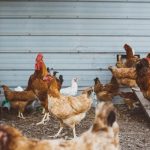Keeping chickens and dogs together can be a rewarding experience for pet owners. Both animals offer companionship, entertainment, and practical benefits such as egg production and pest control. However, integrating these two species requires careful consideration due to their differing needs and behaviors.
Successful cohabitation is possible with proper planning, training, and management. Chickens are social creatures that thrive in flocks and are relatively low-maintenance pets that provide fresh eggs. Dogs, as pack animals with a natural prey drive, may pose a potential risk to chickens.
However, many dogs can be trained to coexist peacefully with chickens under proper supervision. Pet owners must understand the unique requirements of both species to create a safe and harmonious living environment.
Table of Contents
- 1 Considerations for keeping chickens and dogs together
- 2 Training dogs to coexist with chickens
- 3 Providing a safe environment for chickens and dogs
- 4 Managing the health and well-being of chickens and dogs
- 5 Building a routine for caring for chickens and dogs
- 6 Tips for integrating chickens and dogs into your household
- 7 FAQs
- 7.1 What are some important considerations when keeping chickens and dogs together?
- 7.2 How can I train my dog to be safe around chickens?
- 7.3 What are some potential risks of keeping chickens and dogs together?
- 7.4 How can I create a safe environment for both my chickens and dogs?
- 7.5 Are there specific dog breeds that are better suited for living with chickens?
Key Takeaways
- Keeping chickens and dogs together can be a rewarding experience, but it requires careful planning and consideration.
- When keeping chickens and dogs together, it’s important to consider the temperament and behavior of both animals to ensure a harmonious coexistence.
- Training dogs to coexist with chickens involves positive reinforcement, supervision, and gradual exposure to the chickens.
- Providing a safe environment for chickens and dogs includes secure fencing, separate living spaces, and supervision during interactions.
- Managing the health and well-being of chickens and dogs involves regular veterinary care, proper nutrition, and parasite prevention.
Considerations for keeping chickens and dogs together
Assessing Your Dog’s Temperament
Firstly, it’s crucial to assess the temperament and behavior of your dog. Some breeds have a higher prey drive than others, and may pose a greater risk to the safety of your chickens.
Age and Training of Your Dog
The age and training of your dog will also play a significant role in their ability to coexist with chickens. Puppies and untrained dogs may be more likely to chase or harm chickens, while older, well-trained dogs may be more capable of learning to live peacefully alongside them.
Providing a Suitable Living Environment
Another consideration is the living environment for both chickens and dogs. It’s important to provide separate spaces for each species, as well as secure fencing or enclosures to prevent any unwanted interactions. Chickens require a coop or hen house for shelter and nesting, while dogs need a designated area for exercise and play. Additionally, it’s important to consider the size of your property and whether it can comfortably accommodate both chickens and dogs without causing overcrowding or stress for either species.
Training dogs to coexist with chickens

Training your dog to coexist peacefully with chickens is a crucial step in ensuring the safety and well-being of both animals. The key to successful training is to start early and be consistent in your approach. Begin by teaching your dog basic obedience commands such as “sit,” “stay,” and “leave it.” These commands will be essential in managing your dog’s behavior around the chickens.
Next, introduce your dog to the presence of the chickens in a controlled and supervised manner. Keep your dog on a leash and allow them to observe the chickens from a distance. Use positive reinforcement such as treats and praise to reward calm and non-aggressive behavior around the chickens.
Gradually increase the proximity between your dog and the chickens as they become more comfortable with each other. It’s important to closely monitor your dog’s behavior around the chickens at all times, especially during the initial stages of training. If your dog shows any signs of aggression or predatory behavior, immediately redirect their attention and reinforce the appropriate behavior with positive reinforcement.
Consistency and patience are key when training your dog to coexist with chickens, and it may take time for some dogs to fully adjust to the presence of their feathered companions.
Providing a safe environment for chickens and dogs
Creating a safe environment for both chickens and dogs is essential for their well-being and overall harmony. Start by ensuring that your chicken coop or hen house is secure and predator-proof. This includes using sturdy fencing, latches, and locks to prevent access from potential predators such as raccoons, foxes, or stray dogs.
Additionally, provide adequate shelter, nesting boxes, and perches for your chickens to roost and lay eggs. For dogs, it’s important to provide a designated area for exercise and play that is separate from the chicken coop. This can be achieved through the use of fencing or enclosures that prevent direct access to the chickens.
Regular exercise and mental stimulation are important for dogs, so be sure to provide plenty of opportunities for play and activity in their designated area. It’s also important to consider the potential health risks that each species may pose to the other. For example, dogs may carry parasites such as fleas or ticks that could pose a risk to the health of your chickens.
Regular grooming and parasite prevention for your dog can help mitigate this risk. Similarly, chickens can carry diseases such as salmonella, so it’s important to practice good hygiene and sanitation practices when handling them.
Managing the health and well-being of chickens and dogs
Managing the health and well-being of both chickens and dogs requires regular care, observation, and preventative measures. For chickens, this includes providing a balanced diet, access to fresh water, regular cleaning of their living environment, and monitoring for signs of illness or injury. Additionally, regular health check-ups with a veterinarian can help ensure that your chickens remain healthy and free from common poultry diseases.
Dogs also require regular veterinary care, including vaccinations, parasite prevention, and dental care. It’s important to provide a balanced diet that meets their nutritional needs, as well as regular exercise and mental stimulation to keep them physically and mentally healthy. Regular grooming is also important for maintaining your dog’s overall well-being.
When keeping chickens and dogs together, it’s important to be mindful of any potential conflicts that may arise between the two species. For example, some dogs may be prone to chasing or harassing chickens, which can cause stress or injury to the birds. Similarly, chickens may peck or harass a dog if they feel threatened.
It’s important to closely monitor their interactions and intervene if necessary to prevent any potential conflicts.
Building a routine for caring for chickens and dogs

Daily Care Tasks for Chickens
When building a routine for caring for chickens, it’s important to consider tasks such as collecting eggs, cleaning the coop, providing fresh bedding, and monitoring for signs of illness or stress. Additionally, regular health check-ups with a veterinarian can help ensure that your chickens remain healthy and free from common poultry diseases.
Daily Care Tasks for Dogs
For dogs, a routine should include regular exercise, feeding times, grooming sessions, training sessions, and monitoring for any changes in behavior or health.
Mental Stimulation for Dogs
Providing mental stimulation through interactive toys or training exercises can help keep your dog engaged and prevent boredom or destructive behaviors.
Tips for integrating chickens and dogs into your household
Integrating chickens and dogs into your household requires patience, consistency, and careful management. Start by gradually introducing your dog to the presence of the chickens in a controlled environment. Use positive reinforcement to reward calm and non-aggressive behavior around the chickens.
Provide separate living spaces for both species, including secure fencing or enclosures to prevent unwanted interactions. This will help minimize any potential conflicts between the two species. Monitor their interactions closely, especially during the initial stages of integration.
Be prepared to intervene if necessary to prevent any potential conflicts or aggression. Consider the individual personalities and behaviors of both your dog and your chickens when integrating them into your household. Some dogs may be more adaptable to living with chickens than others, so it’s important to take their unique traits into account.
Overall, integrating chickens and dogs into your household requires careful planning, training, and management to ensure their safety and well-being. With the right approach, it is possible for these two species to coexist harmoniously and even form unique bonds with each other.
If you’re considering keeping chickens and dogs together, it’s important to ensure that both animals can coexist peacefully. According to a recent article on Poultry Wizard, “The Chicken Coop Country Diner,” it’s crucial to provide separate spaces for your chickens and dogs to prevent any potential conflicts. By following the tips in this article, you can create a harmonious environment for both your feathered and furry friends. (source)
FAQs
What are some important considerations when keeping chickens and dogs together?
Some important considerations when keeping chickens and dogs together include ensuring that the chickens have a secure coop and run to protect them from the dogs, training the dogs to be calm and gentle around the chickens, and supervising interactions between the two animals.
How can I train my dog to be safe around chickens?
To train your dog to be safe around chickens, start by teaching basic obedience commands such as “sit,” “stay,” and “leave it.” Gradually introduce the dog to the chickens while on a leash, and reward calm and gentle behavior. Consistent training and supervision are key to ensuring the safety of both the chickens and the dog.
What are some potential risks of keeping chickens and dogs together?
Some potential risks of keeping chickens and dogs together include the dogs chasing, injuring, or even killing the chickens. Additionally, dogs may be carriers of diseases that can be harmful to chickens, so it’s important to keep up with regular veterinary care for both animals.
How can I create a safe environment for both my chickens and dogs?
To create a safe environment for both chickens and dogs, provide a secure coop and run for the chickens, and ensure that the dogs cannot access the chickens unsupervised. Additionally, provide separate feeding and watering areas for the chickens and dogs to minimize potential conflicts.
Are there specific dog breeds that are better suited for living with chickens?
Some dog breeds are known to have a higher prey drive and may be more prone to chasing or harming chickens. Breeds such as terriers and sighthounds are often not recommended for living with chickens. However, individual temperament and training are also important factors to consider when determining if a specific dog breed is suitable for living with chickens.
Meet Walter, the feathered-friend fanatic of Florida! Nestled in the sunshine state, Walter struts through life with his feathered companions, clucking his way to happiness. With a coop that’s fancier than a five-star hotel, he’s the Don Juan of the chicken world. When he’s not teaching his hens to do the cha-cha, you’ll find him in a heated debate with his prized rooster, Sir Clucks-a-Lot. Walter’s poultry passion is no yolk; he’s the sunny-side-up guy you never knew you needed in your flock of friends!







